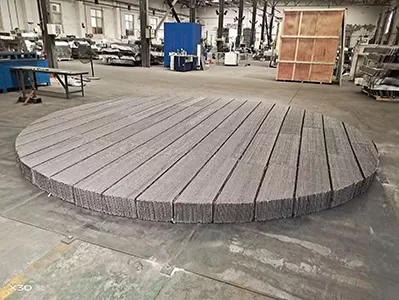Does structured packing Need Acid Washing?
Whether structured packing requires acid washing depends on its material, the process conditions it undergoes, and the degree of fouling or contamination it accumulates. Acid washing is not a universal requirement for structured packing but is often employed as a maintenance or cleaning method in specific scenarios.

For metal-based structured packing (such as stainless steel), acid washing may be necessary when the surface becomes contaminated with scale, rust, or mineral deposits. These deposits can form during long-term operation, especially in processes involving water or aqueous solutions with high mineral content, and may reduce the packing’s efficiency by blocking gas-liquid contact surfaces or altering flow paths. Acid washing, using appropriate dilute acids (e.g., hydrochloric acid or citric acid), helps dissolve and remove such inorganic deposits, restoring the packing’s original surface properties and mass transfer performance.
Ceramic structured packing, which is resistant to most acids, may also benefit from acid washing if it becomes fouled with acid-soluble contaminants. However, plastic structured packing (e.g., polypropylene) is generally not suitable for acid washing, as many plastics are vulnerable to chemical attack by strong acids, which can cause degradation, swelling, or damage to the material. For plastic packing, alternative cleaning methods like water rinsing or mild alkaline cleaning are typically preferred.
It is important to note that acid washing should be performed with caution. The type and concentration of acid used must be compatible with the packing material to avoid corrosion or damage. Manufacturers’ guidelines should be followed to determine the appropriate cleaning agents and procedures, as improper acid washing can compromise the structural integrity of the packing or introduce new contaminants into the process.
In summary, structured packing may require acid washing in cases where inorganic deposits or scale accumulate, particularly for metal and ceramic types. However, it is not a routine necessity and depends on specific operating conditions and material compatibility. Proper assessment of fouling 程度 and adherence to material-specific cleaning protocols are key to ensuring effective and safe maintenance.

